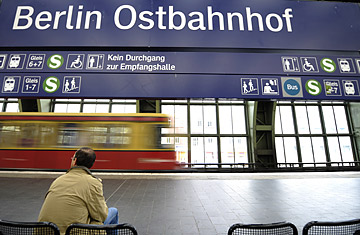
Service on Berlin's regional train network, plunged into chaos in recent weeks by safety problems, may not return to normal until December
Germany's reputation for efficiency is under serious threat, as work on Berlin's main suburban train networks has brought the city to a grinding halt. At the height of tourist season and with Berlin playing host to the World Athletics Championships in just a few weeks, the resulting chaos could not have come at a worse time for the cash-strapped capital.
For the first time in its 85-year history, Berlin's S-Bahn system has slashed services after most of its trains were pulled off the tracks for safety checks. Now only one-third of the 600 S-Bahn trains are running, and 19 stations, including the one at Berlin's Schönefeld airport, are affected by the engineering works. Since July 20, more than a million commuters have been facing long lines and severe delays. Many have had to come up with alternative travel plans and take underground trains, trams, buses, even bicycles — anything to get them from A to B. "It's totally chaotic," says Susanne, a lawyer (who declined to give her last name) waiting at Friedrichstrasse station in the central Mitte district. "I rely on these trains to get to work, and I can't believe they're all down at once." Another disgruntled passenger compared the disruption to "being in the Third World."
Deutsche Bahn, Germany's national rail operator and the S-Bahn's parent company, says it was forced to take the commuter trains out of service after an accident on May 1 in which a carriage of a train derailed after a wheel broke. No one was injured, but the incident spooked authorities. The federal railway agency launched an investigation and issued several urgent safety recommendations. "According to new safety regulations imposed after the accident on May 1, we have to double-check and replace the wheels of our entire S-Bahn fleet more often than we used to in the past," Jürgen Kornmann, spokesman for Deutsche Bahn, tells TIME.
It's a big job. A total of 4,000 wheels will have to be replaced, and all the trains' axles will have to be checked. Meanwhile, union leaders are furious, saying that Deutsche Bahn should have made these fixes years ago. They accuse the rail operator of cutting corners to save money, putting the safety of its passengers and employees at risk. "We warned a long time ago, as far back as 2003, that there were faults on the wheels of Berlin's S-Bahn trains," says Oliver Kaufhold, a spokesman for the German rail union Transnet. "When a third of the city's engineering depots have been shut down and they've cut back staff numbers, it's obvious something will crack one day."
Berlin's creaking urban rail network is just another in a series of problems facing the city. Over the past year, there has been a spate of car burnings in the capital, teachers have written public letters to the authorities complaining about the poor standards at city schools, and youth violence has been on the rise. And the city council is struggling for money after running up new debts this year to the tune of $1.3 billion, bringing its debt total to $85 billion.
On top of all that, the current trouble on the tracks threatens to hit tourism — the idea of navigating Berlin without using its rail network could prove too much for some of the tens of thousands of visitors the city expects over the summer, keeping them and their holiday cash away. And the p.r. nightmare promises to get only worse when Berlin hosts the World Athletics Championships from Aug. 15 to Aug. 23. If everything goes to plan, S-Bahn will have some more trains up and running by Aug. 9 — but services won't return to normal until December. Many Berliners, including the city's mayor, are on vacation and have managed to avoid the chaos. But for those stuck in the capital, it's going to be a frustratingly slow summer.
